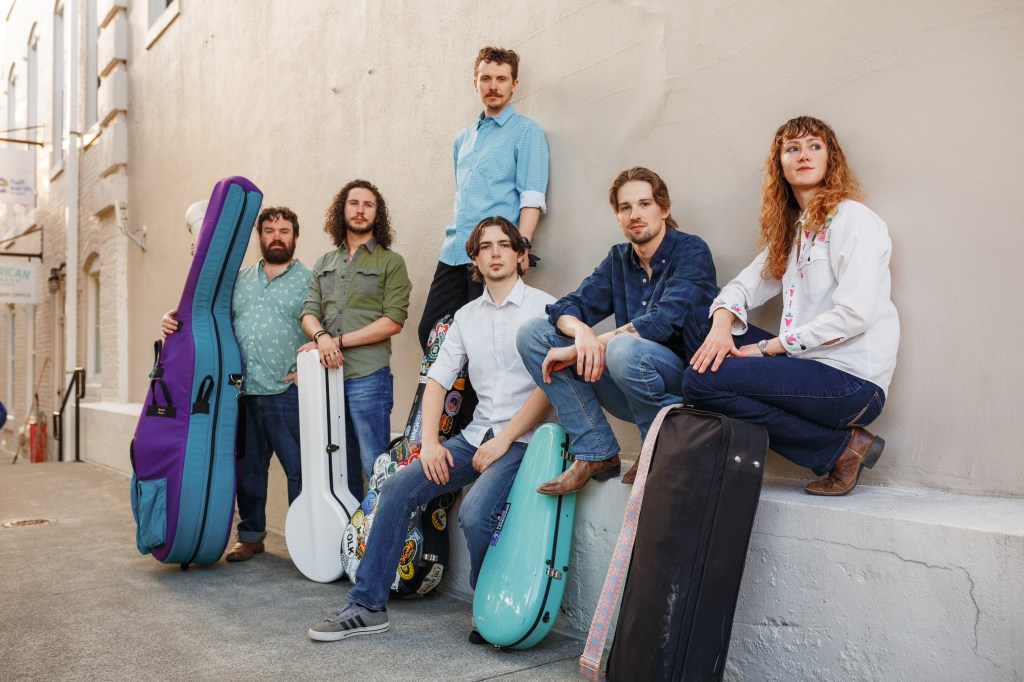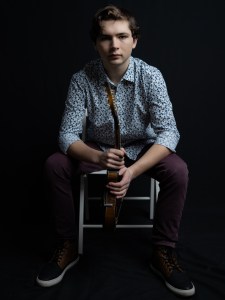

Liam Purcell & Cane Mill Road Heidi Holloway
This has been an interesting year so far. I mean, I seem to be drawn to bluegrass acts, from the Kitchen Dwellers to Molly Tuttle and now a relative newcomer Liam Purcell and his band Cane Mill Road.
Having checked out links to his music and his website I discovered that he is a young and gifted string player with talents that are off the charts. He received first place honors on mandolin, banjo and guitar at the Rockygrass Instrumental Championships in Colorado in 2022, a simultaneous victory that no one else has ever achieved.
Before that, at the tender age of 17, he formed Cane Mill Road which won the International Bluegrass Music Association’s “Momentum Band of the Year Award” in 2019. And in May of this year, he graduated from Berklee College of Music in Boston, then he and his band hit the road for more than two months of heavy touring.
Needless to say, he was someone I really wanted to chat with! When contacted through his website, he settled on Aug. 1 for me to call him as he traveled.


Liam Purcell Heidi Holloway
Q: So I guess I’m calling you when you’re literally on the road, right?
A: Yeah, I’ve got to go to Atlanta tomorrow night for a show and it’s back to Nashville the next day, so I’m running some errands around here before we leave.
Q: This upcoming show in Atlanta, is it part of the tour that’ll be bringing you up to Maine?
A: We’ve got a couple of weekend runs in August that we’re doing and then, on Aug. 28, we will leave for about a monthlong tour that brings us up through Maine.
Q: Have you played up here before?
A: Yeah, well, I lived in Boston for four years going to Berklee so I spent a lot of time up there. I was in a couple of different tours and bands that played around the whole northeast regional area.
Q: Have you performed at One Longfellow Square before?
A: No, we played at the Maine Crafts event which was great, I loved Portland, we got to see lots of stuff there. Also my mando professor at Berklee, Joe Walsh, lives in Portland … that certainly brought us a connection to the city and we’ve visited a few times with that.
Q: Well, One Longfellow is wonderful in that you can stand on stage and make eye contact with everyone there.
A: Absolutely, Joe recommended it when we were considering offers for Portland. He said, “That’s the room you want to go to.”
Q: So I hear you have something new out, is it a new album or just a single?
A: Yeah, we have a full, new album out, it’s our first on Time Capsule Records. We signed a record contract in the fall and put this album out in April and have been touring it. We’re super excited, you know, this is our first album with a tune of airplay on Sirius XM, and the album itself has been a long time in the works, years of writing and arranging, and it’s called “Yellow Line.”
Q: Now it seems to me that bluegrass has been around a while and it also seems to have a lot of variations that have arisen over the years. To what would you attribute its longevity?
A: Well, I think the history of the music is still relatively young when compared to a lot of art forms. and even though we have this rich Appalachian tradition, I think a lot of people hear bluegrass and they think something very traditional. While I grew up rooted in that stuff, I think all the people that I admired as innovators, all the way back to Bill Monroe or the Stanley Brothers, all really added their own contributions to it. And I don’t think there’s necessarily a set direction that bluegrass is going. I think we’re seeing a lot of people put their own spin on it in a beautiful way.
Q: What’s your ‘spin’ on the genre?
A: We’re very committed to the string band format of playing, but we always try and use it in different ways. That is something I find beautiful about a lot of modern bluegrass music, it seems to be keeping the tradition strong.
Q: And it keeps it vibrant, it keeps it alive, and you never know what’s going to come next, and I think that’s probably the best part of it all.
A: Totally. I think a lot of people in the last couple of generations have grown up first a fan of bluegrass rather than specific artists or bands. And I think one difference that I’ve seen over my relative short lifetime so far (chuckle) is we’re seeing a lot of people becoming avid bluegrass fans because of one band, be it Billy Strings or Molly Tuttle or The Infamous String Dusters or even folks on the traditional side of things like the Po’ Ramblin’ Boys or The Kody Norris Show. There are people who are introduced to bluegrass and then become part of this broader, larger fan base because the music has become kind of decentralized from the Appalachian region where it started.
Q: What do you see as the future for the genre?
A: I don’t have a very clear picture of where the music is headed but something that has always remained very strong about this community to me over the years is the interconnectedness of the people involved and also, I like saying, the thin barrier between “picker and grinner,” there’s not much to stop both from becoming proficient and precipatory in the music that they love, which is not the case in a lot of genres. So as far as our musical future, we’re always looking for anything that allows us to express what we hear in our heads a little more freely.
Q: What can folks expect at the One Longfellow Square show?
A: Well, I would say, “Expect to be sitting on our front porch in North Carolina.” We write most of our own material and while the show is very high-energy we also care a lot about telling stories through music and words, actually. So we’ll play a lot of stuff that you can hear on an album and also a lot of things that we find beautiful and motivating and would like to share with the audience. It’ll be an intimate evening but also high-energy and fun, for certain; and we can’t wait to make some new friends. That’s one of the things I like about traveling across the country, not just the shows and the music, that’s the vehicle for getting places, for certain, but I love connecting with folks on a personal level and hearing stories and learning about the places we visit. So, I’m looking forward to all that at One Longfellow.
Q: Is there anything you’d like to pass along to the folks reading this article?
A: I would like to say that Ella Jordan, our fiddle player, has a Portland connection: she has lived there for a couple of years, she’s also a Berklee graduate but moved up to Portland right after the pandemic.
Q: And she’s joined by Rob McCormac on guitar, Jacob Smith on bass, and Zack Vickers on banjo, and I thought it was rather cool that you would list your audio engineer, Alex Naismith, in with the other group members.
A: Oh yeah, he’s an equal member of the band with the rest of us and he’s also a wonderful musician. He’s there at all our rehearsals and after shows there’s nobody I trust more to tell us what went well or what went poorly or what we should change, yeah, he’s an incredible guy.
Lucky Clark, a 2018 “Keeping the Blues Alive” Award winner, has spent more than 50 years writing about good music and the people who make it. He can be reached at luckyc@myfairpoint.net if you have any questions, comments or suggestions.
(Except for the headline, this story has not been edited by PostX News and is published from a syndicated feed.)

